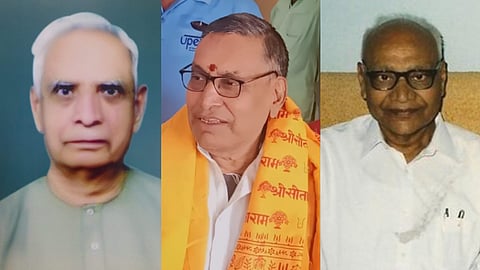

Namita Bajpai
LUCKNOW: As Ayodhya is poised for the consecration of Ram Lalla at his permanent abode, the solemnity of the event is tinged with a sense of loss, as the three 'next friends' who had diligently represented the deity in various courts throughout the protracted legal battles for Janmabhoomi since 1989 are no longer present to bear witness to this historic moment.
Under Indian law, a deity is deemed to be an individual entity, and like a firm or a trust, it can contest its own case. The deity (Ram Lalla Virajman) is a perpetual minor and needed a ‘next friend’ to represent him in court.
On November 9, 2029, when the Supreme Court of India delivered the verdict over the contentious Ram Janmabhoomi-Babri Masjid title dispute, Ram Lalla Virajman was declared the owner of the 2.77-acre disputed land in Ayodhya, leaving his ‘next friend’ Triloki Nath Pandey delighted.
Then Pandey was on the wrong side of his age, and at 75 he was observing a waterless (nirjal) fast, which he ended after the pronouncement of judgement. “Bhagwan Ram’s second exile has ended now. He will now be able to move to his permanent abode after spending so many decades in a tent. It is the victory of Ram Lalla Virajman, but the best thing is that no one has lost," Pandey had said while speaking to media persons after the verdict.
Pandey, who was instrumental in representing Ram Lalla Virajman in the legal proceedings, will not be there to see the deity's installation after he died from a heart attack in September 2021.
In fact, the concept of ‘next friend’ was introduced by Deoki Nandan Agarwal, an Allahabad (now Prayagraj) advocate who later rose through the ranks to become a judge in Allahabad High Court.
After his retirement, he played ‘next friend’ to Ram Lalla after extensive research of the documents related to the Janmabhoomi dispute and filed a petition in Allahabad High Court in 1989, claiming the land belonged to Ram Lalla and he was his ‘next friend’. Agarwal, who later joined the Vishwa Hindu Parishad, continued to represent the deity in legal fights until 1996.
Under Indian law, a deity, such as Ram Lalla Virajman, is recognized as an individual entity capable of legal action. Deoki Nandan Agarwal, a retired High Court judge, served as the initial 'next friend' from 1986 to 1996. Thakur Prasad Verma, a history professor, assumed the role from 1996 to 2009, followed by Triloki Nath Pandey until his demise in 2021.
After Agarwal, historian Thakur Prasad Verma, a Banaras Hindu University professor, took over the baton and represented Ram Lalla Virajman in court from 1996 to 2009. Later, his age and frail health failed Verma, and he passed on the baton to Triloki Nath Pandey, a VHP office-bearer, in 2008, when Pandey took over as ‘next friend’ of Ram Lalla Virajman.
In the absence of all three next friends, the moment of the consecration of Ram Lalla is a difficult one, but it is also nostalgic for their families.
Deoki Nandan Agarwal’s daughter Meenu, who has come all the way from Barmingham to witness the ceremony, falls short of words to express the emotions her father would have felt while seeing Ram Lalla move to his home. She recalls the odds and the hardships her father was made to go through by his dispensation for being the next friend of Ram Lalla, despite his stature as a retired High Court judge.
Similarly, Siddharth Verma, son of Prof. Thakur Prasad Verma, recalls that his father had also read out the 12th-century Shilapatta (plaque) in Nagari script and Sanskrit that was used to establish that the place belonged to Avatar of Vishnu, who killed Bali and Ravana. The temple was more than just a cause for his father.
Pandey’s son Amit, a software engineer based in Gurgaon, recalls that the Ram Janmabhoomi case was of supreme importance for this father. Pandey's wife, Kamla Devi, is an invitee to the consecration ceremony, and she has already reached the temple town.
Amit recalls how his father would always be confident of the outcome of the court case in the vexed issue. “I know the outcome... but the judgement is a matter of time,” Amit recalls his father's thoughts.